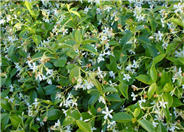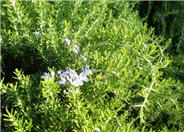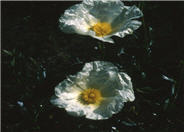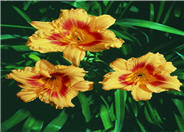
Common name:Star Jasmine
Botanical name:Trachelospermum jasminoides
The Star Jasmine is an evergreen vine that grows 20' tall or as a groundcover that reaches 1'-2' tall and 4'-5' wide. It has white fragrant flowers in the summer and can tolerate sun or partial shade. The Star Jasmine is also drought tolerant.

Common name:Rosemary
Botanical name:Rosmarinus officinalis
Rosemary is hardy in full sun areas where winter temperatures do not drop below 10 degrees F. They can be grown in a clay pot with well-drained, porous soil in bright indoor light, and will also flourish on the backporch in spring, summer and fall. Its beautiful, slowly trailing stems and shiny slender leaves are perfect for showing off the small, light blue flowers that blossom in the summer.

Common name:Rockrose
Botanical name:Cistus palhinae
The palhinae variety produces long, pointed leaves and large white flowers with a small crimson spot. Its narrow leaves, rounded at the tips, are well-covered with a beautiful shiny, sticky resin, appearing "varnished." The plant requires average to good drainage, and little or no summer watering when established. It should be grown in sun or part shade.

Common name:Black-Eyed Stella Hybrid Daylily
Botanical name:Hemerocallis 'Black-Eyed Stella'
This is an All-America Daylily Award Winner! It is stunning with a bright, yellow gold flower with a reddish eyezone and dark, blue green foliage. This Daylily looks better in mass plantings. Created from 'Stella de Oro', the most successful Daylily in history, 'Black-Eyed Stella' was the result of over 3,000 hybrid crosses. It has been rated as excellent for growth in eight zones across the U.S. and Canada.
| Designer: | Grand Wood Fence |
Photographer: GardenSoft |
Soils and Compost:
Incorporate compost 6" into your soil to retain water, reduce compaction, feed earthworms, and provide valuable nutrients to your plants.
Water Saving Tip:
Irrigate in the early morning to minimize evaporation.
Integrated Pest Management:
Remove irrigation water and fertilizer from areas where you don't want weeds to grow.

